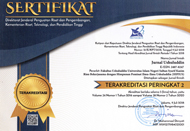Analysing The Understanding Of Childfree Practitioners From Islamic Academia On The Hadith About Multiplying Offspring
Abstract
Keywords
Full Text:
PDFReferences
Abdussamad, H. Zuchri, dan M. Si Sik. Metode penelitian kualitatif. CV. Syakir Media Press, 2021. https://books.google.com/books?hl=id&lr=&id=JtKREAAAQBAJ&oi=fnd&pg=PR5&dq=metode+penelitian+kualitatif&ots=vDDzBU16Q-&sig=a8JLJDP-VyL8wNV3sOe_q3MjI6w.
Al-Bugha, Musthafa Dieb, dan Muhyiddin Mistu. Al-Wafi: Syarah Hadis Arba’in Imam an-Nawawi. Qisthi Press, 2017. https://books.google.com/books?hl=id&lr=&id=EfSvDgAAQBAJ&oi=fnd&pg=PA1&dq=kitab+syarah+imam+nawawi&ots=uG9FF52yTn&sig=VtNurJQQ1hvJr13FiUw5lZ5Eq44.
Habibi, Jk, Khoirul Ma’arif, Adji Pratama Putra, dan Agung Burhanusyihab. “Perkawinan Childfree dalam Perspektif Hukum Islam.” Jurnal Transformatif (Islamic Studies) 7, no. 2 (2023): 139–52.
Haecal, M. Irfan Farraz, Hidayatul Fikra, dan Wahyudin Darmalaksana. “Analisis Fenomena Childfree di Masyarakat: Studi Takhrij dan Syarah Hadis dengan Pendekatan Hukum Islam.” Dalam Gunung Djati Conference Series, 8:219–33, 2022. https://conferences.uinsgd.ac.id/index.php/gdcs/article/view/566.
Khasanah, Uswatul, dan Muhammad Rosyid Ridho. “Childfree Perspektif Hak Reproduksi Perempuan Dalam Islam.” Al-Syakhsiyyah: Journal of Law & Family Studies 3, no. 2 (2021): 104–28.
Maulida Rohmatul Laili, Ellyda Retpitasari Retpitasari, dan Irma Juliawati. “Interpretasi Islam Atas Wacana Childfree Gita Savitri.” Kediri Journal of Journalism and Digital Media (KJOURDIA) 1, no. 1 (4 Oktober 2023): 44–69. https://doi.org/10.30762/kjourdia.v1i1.1384.
Mubarak, Jihan Salma, Eva Meidi Kulsum, dan Wahyudin Darmalaksana. “Syarah Hadis Seputar Fenomena Childfree di Indonesia dengan Pendekatan Ijmali.” Dalam Gunung Djati Conference Series, 8:270–82, 2022. https://conferences.uinsgd.ac.id/index.php/gdcs/article/view/571.
Putra, Dede Dwiansyah, Ardo Okilanda, Arisman Arisman, Muhsana El Cintami Lanos, Siti Ayu Risma Putri, Mutiara Fajar, Hikmah Lestari, dan Sugar Wanto. “Kupas Tuntas Penelitian Pengembangan Model Borg & Gall.” Wahana Dedikasi: Jurnal PkM Ilmu Kependidikan 3, no. 1 (2020): 46.
Rahman, Desi, Alya Syahwa Fitria, Dhea Anisa Lutfiyanti, Ilyasa Irfan MR, Shakira Mauludy Putri Fadillah, dan Muhamad Parhan. “Childfree dalam Perspektif Islam: Solusi atau Kontroversi?” Jurnal Wanita dan Keluarga 4, no. 1 (t.t.): 1–14.
Wathoni, Kharisul Wathoni, Yuli Salis Hijriyani, dan Alda Ismi Azizah. “Konsep Childfree Perspektif Pendidikan Keluarga Dalam Islam.” WISDOM: Jurnal Pendidikan Anak Usia Dini 4, no. 1 (2023): 113–26.
Wijaya, Roma. “Respon Al-Qur’an Atas Trend Childfree (Analisis Tafsir Maqāṣidi).” Al-Dzikra: Jurnal Studi Ilmu al-Qur’an dan al-Hadits 16, no. 1 (2022): 41–60.
DOI: http://dx.doi.org/10.24014/jush.v32i2.32406
Refbacks
- There are currently no refbacks.
 Jurnal Ushuluddin Indexed By:
Jurnal Ushuluddin Indexed By:
Alamat Redaksi:
 Fakultas Ushuluddin UIN SUSKA Riau Jl. H.R. Soebrantas KM. 15,5 Panam – Pekanbaru
Fakultas Ushuluddin UIN SUSKA Riau Jl. H.R. Soebrantas KM. 15,5 Panam – Pekanbaru
 E-mail: jurnal.ushuluddin@uin-suska.ac.id
E-mail: jurnal.ushuluddin@uin-suska.ac.id
ejournal: http://ejournal.uin-suska.ac.id/index.php/ushuludin

Jurnal Ushuluddin is licensed under a Lisensi Creative Commons Atribusi 4.0 Internasional.

















